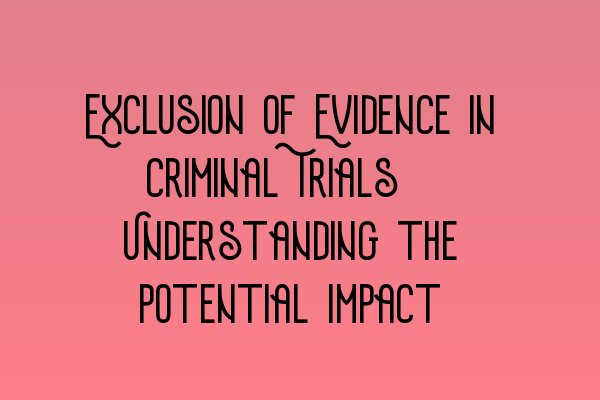Exclusion of Evidence in Criminal Trials: Understanding the Potential Impact
Welcome to SQE Criminal Law & Practice Law UK, where we strive to provide you with in-depth knowledge and insights into various aspects of criminal law. Today, we will be discussing the exclusion of evidence in criminal trials and its potential impact. Understanding this topic is crucial for both aspiring criminal lawyers and individuals interested in the criminal justice system.
Evidence plays a crucial role in any criminal trial. It serves as the foundation on which the prosecution builds its case, and the defense challenges its validity. However, certain circumstances may lead to the exclusion of evidence, rendering it inadmissible in court. This exclusion can significantly impact the outcome of a trial.
Why is evidence excluded in criminal trials?
The exclusion of evidence is primarily aimed at ensuring fair and just trials. There are various grounds on which evidence can be excluded, such as:
- The evidence was obtained unlawfully
- The evidence is unreliable or lacks credibility
- The evidence would unfairly prejudice the accused
- The evidence was improperly obtained, for example, through coercion or duress
These grounds, among others, provide a framework for determining the admissibility of evidence in criminal trials. It is important for both prosecutors and defense lawyers to be aware of these rules to effectively present their case.
The potential impact of excluded evidence
The exclusion of evidence can have a significant impact on the outcome of a criminal trial. It may weaken the case of the prosecution or strengthen the defense’s position. When key evidence is excluded, it can result in the inability to prove the guilt of the accused beyond a reasonable doubt. This may lead to reduced charges, acquittal, or even a mistrial.
To better understand the potential impact of excluding evidence, let’s consider a hypothetical scenario:
John is accused of committing burglary. The prosecution presents surveillance footage from a nearby store as evidence to establish his presence at the crime scene. However, it is discovered that the footage was obtained without a proper warrant and violates John’s right to privacy. As a result, the court excludes the video as evidence.
In this scenario, the exclusion of the surveillance footage weakens the prosecution’s case. Without video evidence linking John to the crime scene, the prosecution may struggle to establish his guilt beyond a reasonable doubt. This could result in a favorable outcome for the defense.
Understanding the potential impact of excluding evidence highlights the importance of meticulously analyzing and presenting evidence in criminal trials. Both the prosecution and defense must be well-versed in the law surrounding the admissibility of evidence to ensure a fair and just trial.
Conclusion
The exclusion of evidence in criminal trials can have a significant impact on the outcome and fairness of the proceedings. Understanding the grounds for exclusion and their potential impact is essential for all individuals involved in the criminal justice system.
At SQE Criminal Law & Practice Law UK, we offer comprehensive preparation courses for both SQE 1 and SQE 2 exams. If you’re looking to enhance your knowledge and skills in criminal law, we highly recommend our SQE 1 Preparation Courses and SQE 2 Preparation Courses. These courses cover a wide range of topics, including the exclusion of evidence.
Stay up to date with the latest developments in the legal field, including SQE exam dates, by checking out our article on SRA SQE Exam Dates. For additional practice, you can also access our SQE 1 Practice Exam Questions and SQE 1 Practice Mocks FLK1 FLK2 quizzes.
We hope this blog post has provided you with valuable insights into the exclusion of evidence in criminal trials. If you have any questions or would like to learn more about our SQE preparation courses, feel free to contact us. Thank you for reading!
